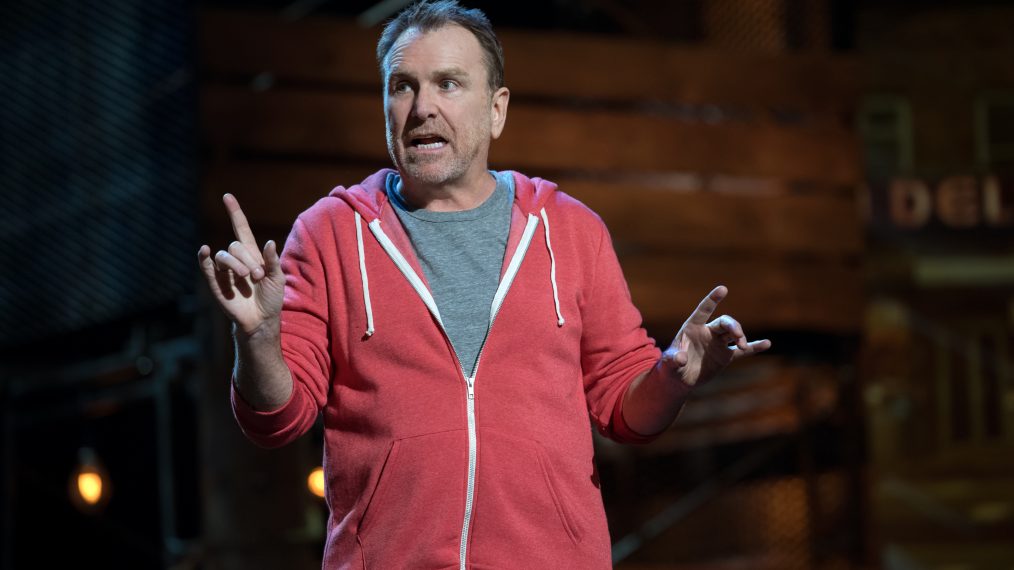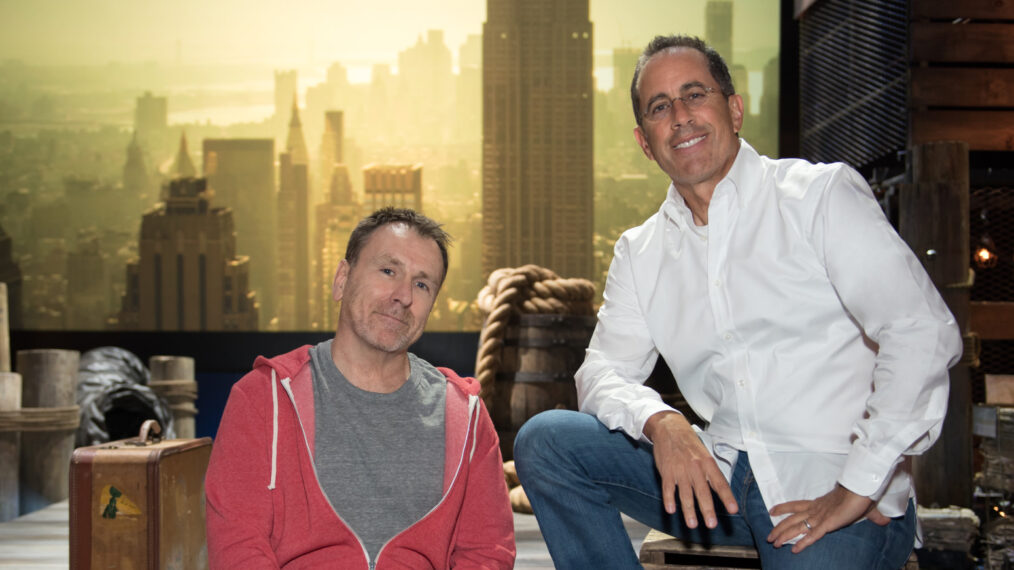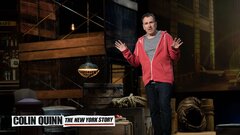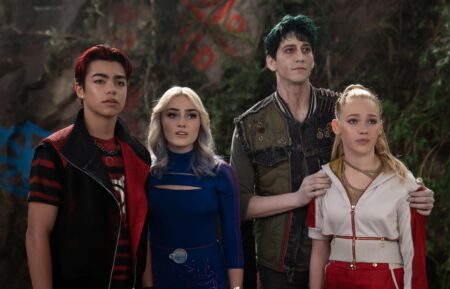Colin Quinn on Doing One-Man Shows, How Immigrants Built New York, and Missing ‘Tough Crowd’

When I met Colin Quinn outside the cafe he chose for our interview, he got off his phone, shook my hand, and said in a tone that anyone who’s been following his three-decade career would recognize, “This is a horrible place for an interview. It’s loud and crowded.”
It’s a tone of weary acceptance that hides the fact that Quinn’s the ultimate “comedian’s comedian,” especially now that the person who previously held the title, Louis C.K., is a superstar. Quinn first came to people’s attention as the announcer on the very ’80s MTV game show Remote Control, then took the helm of SNL‘s Weekend Update from Norm MacDonald in the mid ’90s, and held the post-Daily Show timeslot pre-Colbert with the much-missed Tough Crowd. The entire time, Quinn has earned the respect of every comic star from Jerry Seinfeld to Lena Dunham (who cast him as the owner of Cafe Grumpy on Girls).
RELATED: Iliza Shlesinger on Her Netflix Special, Forever 31 and How Women Need to Treat Each Other
The quiet confidence can be seen in some faux arrogance when a couple of women in the cafe talk to him about mutual friends in comedy but don’t know who he is. They guess he was on a detective show like Blue Bloods. “I’m too big for Blue Bloods,” he jokes. “If they put me on they’d think I was doing a guest spot. They’re sadly mistaken.”
Since 2011, Quinn has been plying his stand-up trade in the form of one-man shows that explore larger issues than usually seen in a regular stand-up act. First there was the Seinfeld-directed Broadway show Long Story Short, that dared to take on the history of human civilization; then in 2015 Quinn examined the Constitution in Unconstitutional. This year, Quinn returned to the stage with The New York Story (also directed by Seinfeld), a look at how immigrants shaped New York from the Dutch until today. The show, which had a run at the Cherry Lane Theatre in Lower Manhattan, will be released as a special on Netflix on Nov. 18.
Seinfeld was the one who encouraged Quinn to do shows in this format. “I’d done a couple about my family, about my block. He goes ‘You should do another one-man show.’ That’s when I started doing [Long Story Short].” So why start with massive topics like the history of New York?
“I never thought of myself as a history buff, but I mean I like history all right. The only time I really started taking history seriously is when I did [Unconstitutional], because I didn’t understand. The other subjects you can be like, ‘Oh, yeah, I understand this, I understand the Romans to a degree, or the Greeks, or whatever they were trying to do,’ but the Constitution I didn’t understand at all, and everybody loved it. I was like why do people love this boring legal document? I just didn’t get it.
“Over the course of reading these books on it, that was like that’s why we have this personality in America. That’s why we’re more outraged by a governmental abuse, authority abuse, than we are by other people … You know what I mean, that’s why everybody is yelling on news shows, giving advice to when the cops pull you over, and all that stuff. That’s where it comes from.”
Just like any stand-up comedian trying out new material, Quinn got this show on its feet in the intimate environment of comedy clubs. “If you can make this stuff work in the club, it’s going to work anywhere because clubs are used to ADD, changing subjects, a lot of sex,” he says. “I’m framing [the material] so it’s all connected, rather than just ten minutes on race, ten minutes on my relationship, ten minutes on an idiot that I met on the train. Instead, I’m trying to connect everything, and it’s better for me. It clarifies material in my head. It brings back bits I never thought about for years, sometimes. Like I’m trying to make sense of the world, for myself.”
What did Seinfeld bring to his stage shows? “I feel like he brings heavy editing, structural things, where he’s like if that doesn’t make sense, Jerry’s not afraid to go ‘I don’t get it.’ A lot of comedians will be like ‘I get everything.’ He’s like ‘I don’t get it. What are you saying?’ Then I have to figure out what I’m saying, if Jerry doesn’t get it, who’s going to get it? He’s actually a stage director in his heart of hearts.”

Jerry Seinfeld directed Colin Quinn’s latest one-man show, The New York Story.
The New York Story is the Brooklyn native’s chance to explain how most aspects of the city he loves have been contributed by immigrants over hundreds of years: The Dutch who bought the island from Native American tribes, Germans, Italians, Irish, Jews, Latinos, all the way up to the immigrants who work hard there today. “That’s where the country started was all these ethnic groups, so even if you lived in Missouri, you’re probably Germanic, or Swedish, or black, or Irish, or something. There was a route that you had there.” In his research for the special, the most surprising thing he learned was “That the f-word came from Holland. That was really wild. It made me so happy, as you can imagine, because I’m trying to connect what the Dutch personality was, and that word is New York.”
RELATED: Russell Peters: Almost Famous Coming to Netflix
What does he miss about the New York of his (and my) youth, the gritter version where the subways were caked in graffiti, the Bronx was on fire and everyone talked in that telltale “New Yawk” accent? “The personalities, the lack of chain stores. When it was just individually owned stores, it felt like it was more personality.” He lives in Tribeca, but for the first time in his life, he’s thinking of going to the ‘burbs. “I have to say the past couple years, it’s so crowded like this, it’s so packed, even there’s lines to get on the train, and for the first time in my life I’m like I should live somewhere else, like near the city, not far, but I should live outside the city. My dream as a kid was Manhattan. That’s all I cared about. I still get a little bit of a feeling, but it’s not quite. There’s something missing. One corner is the Bank of America, the other is a CVS. The other corner is a TGIFridays.”
He also misses some of the more, well, colorful language we used to use as a society, even though he tries to avoid those terms in his own more recent comedy. It’s a topic he touches on in The New York Story as he tries to tell a joke using no gender or ethnic terms.
“The language has gotten so oppressive for comedy,” he says, “and now with everybody online weighing in … People have cracked up now. First of all, who’s making these decisions, because it’s already disturbing, and it’s very Orwellian. I understand psychology of language, like I get where people are trying to come from. It’s very subjective, and it feels very strange to me. If you want to have bland generalities, we’ve got them now. I feel like it effects comedy because comedy is about specifics. If I’m telling you a story, and I’m going to say ‘this black guy,’ or ‘this Italian guy,’ and people are like ‘Whoa, whoa, whoa!’, it becomes this weird thing in there. I don’t understand it.”
Because of this environment, he wishes Tough Crowd with Colin Quinn, the 2002-04 show where he and outspoken comedians like Kevin Hart, Nick DiPaolo, Jim Norton and the late Patrice O’Neal and Greg Giraldo would talk (and argue!) about the issues of the day, was back. “Oh, my God, yes. Now we’d be trending everyday. There are three to six things I said on the show everyday that would be outlawed today, almost. People would be like ‘That cannot be said,’ everyday I was there.”
It wouldn’t be the same, of course, without O’Neal and Giraldo, who challenged each other on issues of race, class, and other hot-button topics. But he thinks the show would work in the exact same format it was back then because, “Our job was to be funny. If you can get your opinion in and be funny, and make it insightful, that’s all the better. Nobody is there to hear you preaching. ‘I think it’s wrong what goes on,’ so does everyone, so does my aunt.”
Colin Quinn: The New York Story, Premieres Friday, Nov. 18, Netflix.








